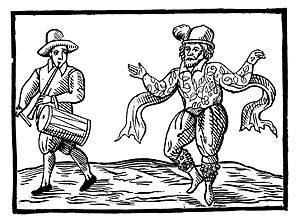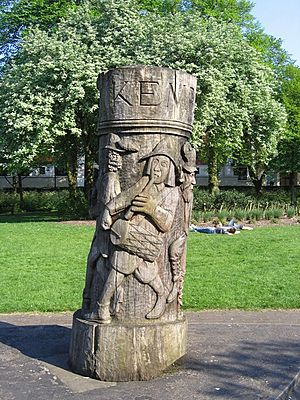William Kempe facts for kids
Quick facts for kids
William Kempe
|
|
|---|---|

Woodcut of Kempe (right) from Nine Days Wonder (1600)
|
|
| Born |
William Kempe
c. 1560 |
| Died | c. 1603 (aged about 43) |
| Nationality | English |
| Other names | Will Kemp |
| Occupation | actor |
| Years active | 1585 or earlier–1603 |
| Known for | Playing comic roles in William Shakespeare's plays |
William Kempe (born around 1560 – died around 1603), often called Will Kemp, was a famous English actor and dancer. He was known for his funny roles and was one of the first actors to perform in plays by William Shakespeare. People thought he was the best clown of his time, following in the footsteps of another great clown, Richard Tarlton.
Kempe was very successful and important. By 1598, he was one of the five main actors and owners of the Lord Chamberlain's Men. This was Shakespeare's acting company. But soon after, he left the group, perhaps because of a disagreement. Even though he was famous, he seems to have died without much attention or money around 1603.
Contents
Kempe's Early Life and Career
William Kempe was likely born around 1560. We don't know much about his family. Some people think he might have been connected to a wealthy family in Kent, England.
Kempe first appeared as a performer in 1585 with a group called Leicester's Men. He traveled with them to the Low Countries (modern-day Netherlands and Belgium). He even delivered letters for Philip Sidney, a famous writer and soldier. Later, Kempe went to Elsinore, Denmark, with other actors. There, he entertained King Frederick II of Denmark.
In the late 1580s, Kempe's fame grew. A writer named Thomas Nashe dedicated a book to him in 1590. This shows how popular Kempe had become. His name was also used to advertise plays, meaning people would come just to see him perform. He was especially known for his "merriments," which were funny acts.
Joining Shakespeare's Company
By 1592, Kempe was part of Lord Strange's Men, another acting group. In 1594, he joined the Lord Chamberlain's Men with Richard Burbage and William Shakespeare. This was a very important company. Kempe stayed with them until early 1599.
Kempe was involved in the plans to build the famous Globe Theatre. However, he did not perform in any plays there after it opened. It seems he left the company around this time. Some plays by Shakespeare, like Henry V and Hamlet, suggest reasons why Kempe might have left. For example, Hamlet talks about clowns who improvise too much. Kempe played his last role for Shakespeare in 1598.
Kempe's Famous Dance and Later Years
After leaving Shakespeare's company in 1599, Kempe continued to perform. In February and March of 1600, he did something amazing. He morris danced from London to Norwich. This journey was about 110 miles (177 km) long. It took him nine days spread out over several weeks, and he often danced in front of cheering crowds. He later wrote a book about this event called "Nine Days Wonder" to prove it really happened.
After this famous dance, Kempe's life becomes less clear. He might have traveled to Europe again, possibly even to Italy. By 1601, he was borrowing money from Philip Henslowe, a theater owner. He also joined another acting group called Worcester's Men. The last time he is definitely mentioned in records is in late 1602.
Records show that a "Kempe, a man" died in Southwark, London, in late 1603. Many believe this was William Kempe, as he disappears from historical records around this time.
Kempe's Performance Style
William Kempe was famous for his "stage jigs" as much as for his acting. A jig was a short, funny play with music and dancing. It usually had a few performers and involved a lot of physical comedy and improvisation. Two of Kempe's jigs still exist in English. A well-known 17th-century tune called "Kemp's Jig" was named after him.
As an actor, Kempe is known for playing specific roles. He played Dogberry in Shakespeare's Much Ado About Nothing and Peter in Romeo and Juliet. Based on these roles, experts believe he also played other funny characters. These might include Costard in Love's Labours Lost, Bottom in A Midsummer Night's Dream, and Lancelot Gobbo in The Merchant of Venice. The character of Falstaff is a bit different. Falstaff is fun and funny, but he is also a higher-class character than Kempe's usual roles.
William Kempe in Stories and Media
William Kempe has appeared as a character in many stories, movies, and TV shows.
In Older Stories
- He is a character in a play called The Return from Parnassus. In this play, he praises Shakespeare's writing.
In Modern Movies and TV Shows
- In the 1978 TV series Will Shakespeare, Kempe is replaced by another actor.
- In the 1998 movie Shakespeare in Love, Patrick Barlow plays him.
- He is in the 2005 TV film A Waste of Shame, played by John Voce.
- In the 2007 Doctor Who episode "The Shakespeare Code", David Westhead plays Kempe.
- In the 2016 BBC show Upstart Crow, Spencer Jones plays a funny version of Kempe.
- In the 2017 TV series Will, he is played by William Houston.
In Modern Books
- Paul Aldred's 2022 book for young adults, Will Kempe, Clown, is about his last years with Shakespeare's company.
- He is a key character in Kevin Sylvester's 2015 book Neil Flambé and the Bard's Banquet.
- Ann Young's 2002 book The Nine Days Wonder also features him.
- In Neil Gaiman's 1991 graphic novel The Sandman: Dream Country, Kempe appears in a story about Shakespeare's play A Midsummer Night's Dream.
- He is in King of Shadows, a 1999 children's book, where he dances his Nine Days' Morris.
- In Harry Turtledove's 2002 novel Ruled Britannia, Kempe is a main character.
- He appears in J. B. Cheaney's 2004 novel The True Prince.
- The tune "Kempe's Jig" is mentioned in a poem by Geoffrey Hill.
On Stage Today
- Since 1973, Chris Harris has toured with a one-man show called "Kemp's Jig." It tells the story of Kempe's life and his famous dance.
- Dan Roentsch wrote a play called Will Kemp.
- In 2008, comedian Tim FitzHigham re-enacted Kempe's Nine Days' Wonder. He Morris danced from London to Norwich for his play The Bard's Fool.
- In 2021, Tortive Theatre launched a new play about Kempe called Shakespeare's Fool.
In Concerts
- During the COVID-19 lockdowns, a music group called Hexachordia created a "Docu-Concert" called KEMP’S JIG. It follows Kempe's adventures and can be watched online.
Images for kids
See also
 In Spanish: William Kempe para niños
In Spanish: William Kempe para niños
 | Ernest Everett Just |
 | Mary Jackson |
 | Emmett Chappelle |
 | Marie Maynard Daly |




